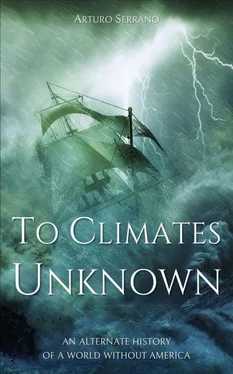During Denmark’s last attempt to regain Munkhaven from the rebels, Admiral Montagu and his crew abandoned the battle in their submarine, the D.H.M. Jasconius , seeing the futility of their mission. With both Canutic and Novadanian fleets patrolling the seas, and the heightened hostility they could expect at any Catholic destination, there was no known place in Christendom where they could hide. Believing they might find shelter in the territory of a friendly nation, they took the Jasconius to a Swedish settlement in West Africa, called the Gold Coast, in the hopes that they’d be able to rest and hide for some months while the war effort took their superiors’ minds off of their desertions. But what they found was that the Swedish government had taken the side of the Novadanians, and their Danish uniforms made their presence unwanted. They gave some thought to crossing the Atlantic and trying their luck in the colony that the Dutch had just founded on the coast of Brazil, but they decided against it, since they couldn’t be sure that the Dutch authorities wouldn’t have been alerted to their disappearance. So, for a few months, they resorted to pillaging goods from Portuguese vessels headed for the Angolan slave markets, until a storm in September forced all non-submarine ships to stay away from the coast. A submarine could wait out the storm in the calmer waters below, but not for too long before having to resurface for air. The first location where they reemerged, near the middle of the South Atlantic, was swarmed with Portuguese, Spanish and even French ships, all waiting for the right time to resume their course toward their respective colonies; the submerged shape in their midst aroused some remarks among the most observant of the tripulants, but as the Danish decided not to attempt an attack against such a numerous enemy, it didn’t merit any more attention.
After renewing their air, the deserters fled to the south, hoping to put distance between them and any potential enemy. One day, they looted a lone Spanish ship on its way home from the Philippines. After sinking it, as was always done to remove any witnesses of submarine technology, they realized that the Jasconius had run out of cannon balls. That moment forced them to face reality. None of them had intended to become pirates, but they unquestionably were, and before they could come to terms with that new state of affairs, they found themselves unable of sustaining even that way of life. They were stranded, unwelcome, and defenseless.
They wandered in that manner for weeks, drawing closer and closer to a family of floating ice masses, avoiding them by passing underneath them as they’d been trained to do in the waters of the north. They encountered some funny flightless birds that they promptly hunted and cooked. After some more days, it became apparent that they had found land, albeit one covered with ice as far as the horizon. They worried about meeting white bears but saw none.
Admiral Montagu ordered his crew to explore the area; nothing was available but rocks, ice, and more of those loud, fatty birds. The soldiers wouldn’t starve as long as those birds remained so easy to kill, but a settlement couldn’t be built if there was no wood. Discussion was brief, and Montagu formulated a plan.
They would go home.
The discovery of new land, unknown and inaccessible to all other nations, was the answer to every dream of the Danish king. Although they had no way of knowing it, what they had reached was an entire continent. The addition of such a possession would more than suffice to gain them their pardon for abandoning their duty.
In the years to come, more submarines would arrive, loaded with wood, ready to replicate in the south the ambitious project underway in the north. They would probably need to wrestle the tip of South America from Spain to gain access to its forests, but they knew the Spanish navy stood no chance.
They were going to claim the polar continent for their king.
And to make whatever riches it contained usable, they were going to burn every single tree within their reach until the ice was gone and the sky was dark if that was what it took.
The reason why God knows which possible futures will happen is not that He chooses to push our choices in a certain direction, but that He chooses to place us in a certain set of circumstances.
Luis de Molina,
Concord Between Human Freedom and Divine Foreknowledge
Now we need to proceed with fantastic imagination and invent how one world could have contact with another.
Giordano Bruno,
On the Infinite Universe and Worlds
Night, September 21 (Gregorian), 1620
Shuri
This is the moment when the currents of consequence meet. This is the day on which multiple threads of fate are twined into one.
Because Drake was knighted and the plank collapsed and our William didn’t live, he didn’t bring to Japan the shipbuilding methods that allowed the Western nations to cross big oceans. A vessel suitable for long distances has not yet been invented in Japan and is therefore not available to take ambassador Hasekura Tsunenaga back home from his last stop at Manila.
As the Mayflower is being captured, as Munk the Dane nears the peak of his sailing exploits, as René marches eastward with the Holy Emperor’s armies, the ill-suited trading ship Japan has sent to retrieve its ambassador can’t maneuver against the winds before hitting a semisubmerged rock and leaving its passengers stranded at the southernmost point under Japanese jurisdiction, the recently annexed archipelago of the Ryūkyūs.
The locals swarmed at the shore and launched boats to help rescue as many tripulants as they could. Tsunenaga was holding on to a floating piece of mast, his retinue nowhere to be seen. Rescuers carrying lanterns pulled up the survivors one by one into the boats. He was on the brink of fainting from exhaustion when they grabbed his arms and dragged him aboard. He cast a desperate look at the remains of the ship, following its unstoppable downward course until it was no longer visible in the depths, and the sea, illuminated by the boats’ lamps, showed him only his own terrified face.
He heard his rescuers shout instructions in their tongue and hours passed before someone spoke in Japanese. They took him to the warmth of a hearth. His luggage, of course, was hopelessly gone, but they gave him food and let him sleep.
Upon waking, he made his first mistake.
He said he needed to board a ship for Sendai. When they asked him why he was in such a hurry and who he was, he hoped they’d agree with him that his mission was crucial to Japan’s future, so he yielded a summary of his years of diplomacy abroad and his present mission. The Ryūkyūans, by that precious gift of contingency that sometimes told a people that they stood at a quickly moving crossroads in the flow of time, knew that this man was necessary to them, and by rapid word of mouth he was first described, then recommended and finally brought before the king of the islands.
Shō Nei was that type of tired man whose entire old age proceeded in reference to a single moment in the past that had thenceforth shackled him to a regret so heavy that it stopped the days from happening and left him solely capable of the basic action of continuing to exist. When Tsunenaga was ordered to sit in front of him, he stared at his guest with no apparent interest, and it seemed for a moment as if no conversation would occur.
“I hear you have seen Europe,” the king said after that long, uncertain pause. His Japanese was accented, but proper, and while Tsunenaga tried to compose his answer in his head, he also struggled to ascertain the precise level of politeness that he was required to use with an older man who ruled a tiny region that was, legally speaking, subordinate to the government he represented. The overlapping layers of the Japanese language could be a hindrance at such times. In the end he opted for maximum deference, because he knew that this bitter, joyless man had no reason to hold any sympathy for Japan, and he was going to have to get through him if he wanted to return home and deliver his report.
Читать дальше












